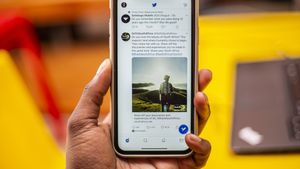
JAKARTA - In this digital world, many people have relied on the internet for all kinds of needs. But it turns out that about 37 percent of the world's population still has never used the internet.
According to research conducted by the International Telecommunication Union (ITU) of the United Nations agency for information and communication technology, the coronavirus pandemic has caused a surge in the number of internet users, but around 3 billion people are not yet able to use it.
In fact, 96 percent of them live in developing countries on average. Due to the coronavirus pandemic, the estimated number of people online has increased from 4.1 billion in 2019 to 4.9 billion this year.
Unfortunately, among those internet users, hundreds of millions may rarely go online, use shared devices or face connection speeds that hinder their internet usage.
“ITU will work to ensure the building blocks are in place to connect the remaining 2.9 billion. We are determined to make sure no one is left behind," said ITU Secretary-General Houlin Zhao.
While the access gap is almost bridged, with 95 percent of the world's population now living within range of a mobile broadband network. However, the growth is uneven.
Internet access is often unaffordable in poor countries, nearly three-quarters of people have never been online in the 46 least developed countries. For example, nearly 30 percent of the rural population in Africa still lacks mobile broadband coverage.
"We can't close the digital divide if we can't measure it, and we can't connect the unconnected if we don't know who they are, where they live, and why they stay offline," said Doreen Bogdan Martin, director of ITU's Telecommunications Development Bureau.
SEE ALSO:
Martin stated that although most of the world's population can access the internet via mobile broadband, less than two-thirds have used it. He added that there is a generation gap, with 71 percent of the world's population aged 15 to 24 using the internet, compared to 57 percent of all other age groups.
“Gender remains a factor. Globally, 62 percent of men use the internet compared to 57 percent of women. While the digital gender gap has narrowed across all regions, women remain digitally marginalized in many of the world's poorest countries, where online access has the potential to have the strongest effect," Martin explained.
"Poverty, illiteracy, limited access to electricity, and a lack of digital skills continue to be challenges for those who are digitally excluded," he added.
The English, Chinese, Japanese, Arabic, and French versions are automatically generated by the AI. So there may still be inaccuracies in translating, please always see Indonesian as our main language. (system supported by DigitalSiber.id)
















